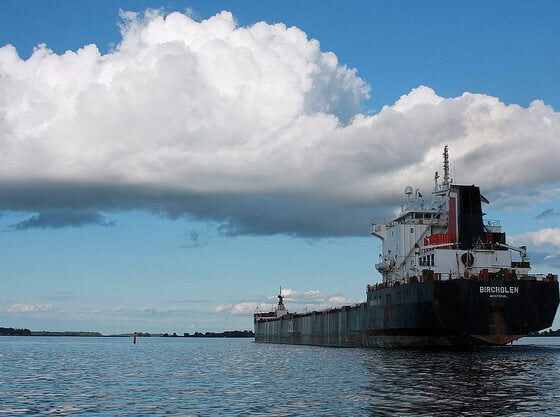

Economy
Global shipping must rethink approach to climate change
Preventing the worst impacts of climate change will require a more sustainable shipping industry, according to a new report.
In High Seas: High Stakes, experts from the Tyndall Centre for Climate Change Research at the University of Manchester say that global shipping must reduce its carbon emissions within the next decade.
They warn that if global warming is to be kept below the 2C threshold, agreed by scientists as the line the world must not cross, emissions from the sector must fall by at least 80% from 1990 levels by 2050.
Currently, global shipping makes up around 3% of global carbon emissions. The International Maritime Organisation (IMO) and the International Chamber of Shipping have already pledged to play their part in efforts to curb climate change.
But with emissions rising, the report warns, to make a “fair and proportional” contribution the sector must rethink its decarbonisation policy.
Opportunities have already been missed – in 2015, new IMO rules will force shipping companies to use fuel with a lower sulphur content, to limit local pollution. The report argues that with a more long-sighted approach, regulators could also have taken action to cut carbon and “address local and global pollution in unison”.
Encouraging ships to “slow-steam” – to run at slower speeds to reduce fuel consumption – is another option.
However, one of the best ways to clean up shipping’s act is to incentivise technology change, the report continues.
Technologies such as computer controlled hybrid wind propulsion systems are “a key opportunity” while encouraging decarbonisation on land, thereby reducing the need for coal, gas and oil imports, would drastically reduce the demand for shipping.
“What was most striking when doing this research, particularly when compared with previous studies on decarbonising other sectors like aviation, is the wealth of opportunities available for reducing CO2 from shipping,” said Alice Bows-Larkin, the principle investigator behind the report.
“The problem with cutting CO2 in the shipping sector is that the system is so complex that influencing change becomes the greatest challenge, even if the political will were there.”
Some maritime leaders are already trying to affect this change. The Sustainable Shipping Initiative (SSI) – a collaborative project originally launched by Forum for the Future – aims to establish a sustainable and profitable maritime industry by the year 2040.
With committees of cross-industry members, including consumers, ship owners, shipbuilders, insurers, engineers and NGOs, the initiative is committed to breaking down the barriers to sustainability.
Speaking to Blue & Green Tomorrow in February, then-director of the SSI Helle Gleie said that she is confident the industry can adapt.
“I’ve been in shipping since 1977, and I know for a fact that once the shipping industry gets the point – and they will start moving – they are fast movers,” she said.
“They will put all their energy into it, and they are very strong communicators. If we do this right […] I think we can take the lead on innovation, and setting new ideas and new frames for how to work with sustainability.”
Photo: zackzen via Flickr
Further reading:
The secret shipping industry uncovered
Sustainable Shipping Initiative: a maritime sea change
The road to nowhere: a call to arms for sustainable transport
Sustainable transport: why it matters
The Guide to Sustainable Transport 2014


 Features9 months ago
Features9 months agoWhat is the Eco-Friendliest Option to Wash Your Dishes?

 Environment12 months ago
Environment12 months agoBuilding a Career in Green Construction: Tips and Insights

 News11 months ago
News11 months ago5 Ways Fleet Maintenance Software Can Help Businesses Be More Eco-Friendly

 Features10 months ago
Features10 months agoAddressing Pressing Ethical Concerns with Crypto Exchanges





























